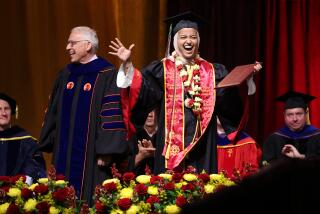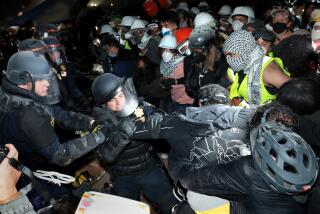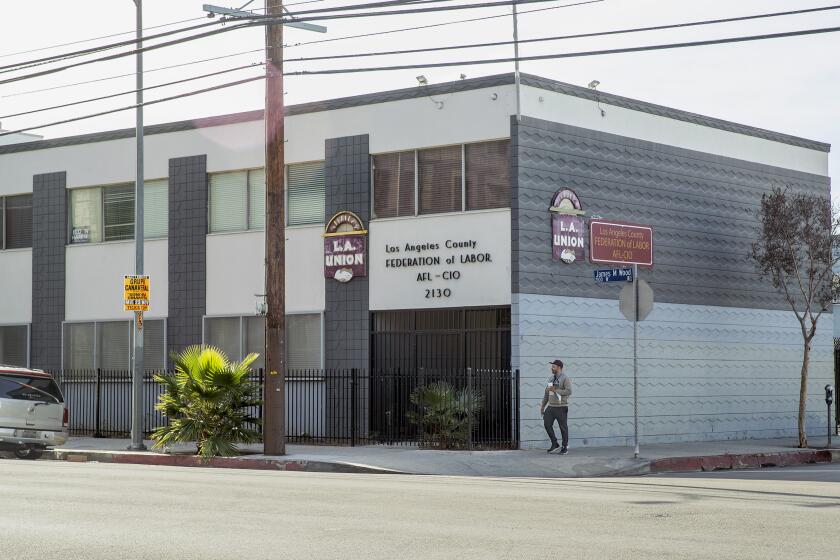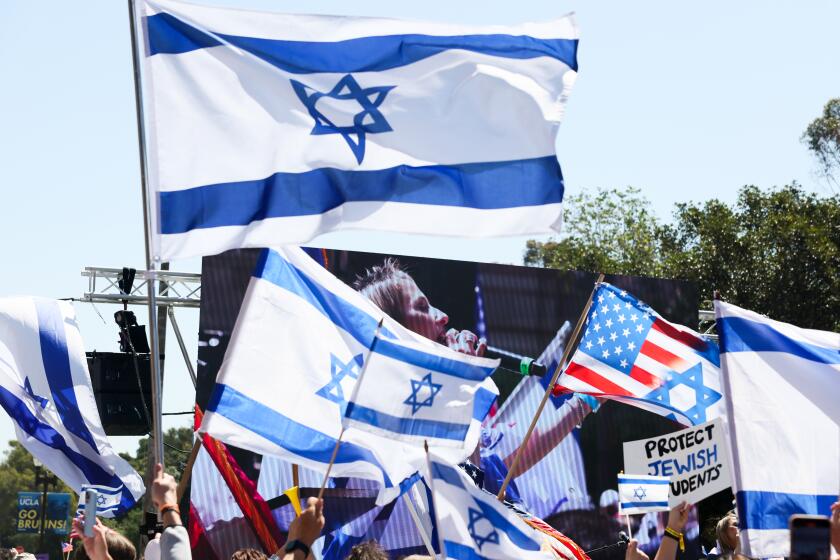A Silent Majority of California Gun Owners Is Caught in the Cross-Fire of Extremists. Maybe It’s Time to Hear From Those Who Are
Yolo County farmer Fritz Durst has been around guns all of his life. He takes his three preteen children out shooting. He owns two shotguns and five rifles, and he keeps one rifle in his pickup truck loaded and ready when he’s on his farm in north-central California. Part of the off-the-grid camo crowd? Some kind of post-Sept. 11 militiaman? No way. The 42-year-old Durst has never owned a handgun; even a child with a squirt gun makes him squeamish. His firearms are long guns meant for killing farm varmints and hunting game. You’ll never see him marching lock-step with the gun fanatics. Durst thinks the National Rifle Assn. can be extremist and believes many gun laws are good.
The UC Davis graduate and fifth-generation farmer is among the majority of gun owners in California who keep firearms for practical reasons. State and national surveys show that the overwhelming majority of gun owners are, like Durst, supporting some of the most controversial gun-control laws. They probably buy most of the 350,000 firearms sold every year in California.
To them, a gun is a machine, not a political issue. Their take on gun laws seldom carries the ideological heat that inflames the dialogue in Sacramento and Washington. If they think the law will reduce gun deaths and injuries, they will support it; if not, they won’t.
Their voices seldom rise above the din from gun and anti-gun zealots. Armed but silent, these moderates are no match for media-savvy gun groups that spit sound bites faster than an AK-47 fires bullets. They don’t care to be. They are either focused on their workaday worlds, or hesitate to speak out because they feel the image of all gun owners has been tarnished by the misfits who shoot up schools and the extremists who get quoted in the media.
“Yeah, anyone who owns a gun must be some yahoo who shoots first and asks questions later,” says a sardonic Tim Henderson, a computer software engineer who recently completed a safety class at American Shooting Center in San Diego in preparation for buying a firearm. Although Henderson and others like him are conspicuously absent from a debate that is all about them and their rights, they are not hard to find. They are everyday citizens who also happen to own guns: a trucker from Madera pulled curbside for the night in an industrial area of Los Angeles; a Compton liquor store owner suspicious of a customer lingering a bit too long at closing time; a retiree living where gunfire is just another street noise; an affluent Asian living in a palatial home overlooking Sunset Boulevard who is worried about racism; a sheep rancher protecting his herd from coyotes; a mother with small children in Long Beach.
One out of every three adults owns firearms in California, a 1999 Los Angeles Times survey found. About 75% are white and 60% are male. Republicans are no more likely than Democrats to be armed. Nearly half have no more than a high school education.
As a group, gun buyers can be as sensitive and as irrational as Wall Street. Sales spiked in the wake of the 1992 Los Angeles riots, the Y2K hysteria in late 1999 and the Sept. 11 terrorist attacks. Most of those featured on the following pages hold political views ranging from libertarian to liberal. Most own two or more guns. A few have permits to carry a weapon wherever they go. Many grew up with weapons around the house. Others had never touched a gun until violence touched them. Self-defense is the single most common reason they cite for owning a gun. (The Times poll found that one of every three owners is armed as a means of protection.)
As a potential force in the gun-control debate, their views would please and dismay both sides. The 1999 Times poll showed that most Californians--gun owners and non-owners alike--think government should check the criminal background of buyers, including those at gun shows. Most also favor banning assault weapons. On the other hand, gun owners are more tolerant of the NRA than people who are not armed, and are more likely to oppose handgun bans. An Ohio State University study released earlier this year found that the less someone trusts the federal government, the more likely they are to take up arms. That mistrust is most extreme among gun owners, who see themselves and their weapons as the last line of defense against government tyranny.
But most gun owners eschew such radicalism. Even in rural areas such as Yolo County, where most people grew up around firearms and know a lot about them, you will not see them doting on their weapons. They can talk about trajectory, and they explain why your chances of nailing a coyote at 250 yards are better when you use a .243-caliber rifle with a 110-grain bullet instead of a .223 with a 55-grain slug. But chances are, they also can tell you what to do if a header bearing in a combine goes bad and you are racing the clock to harvest a wheat field.
For the armed and silent, firearms are tools for work, for recreation, for self-defense. They recognize the 2nd Amendment, but few believe it immunizes firearms from regulation. Durst, the Yolo County farmer, gets frustrated with some gun laws, but he says he understands. “They are created because there are people who aren’t reasonable and responsible,” he says. “The law can be an inconvenience. But not an insurmountable one.”
Free to Make a Reluctant Choice
Harley rider Butch Fuller rails against helmet and seat belt laws and laments any U.S. government incursion against personal freedom. “Whatever happened to free America?” the Madera, Calif., 18-wheel trucker says over his cell phone while cruising down California 99 on a run from Fresno to Los Angeles. “In Texas, you can carry a gun out in the open, and I favor that because [then] all the bad guys know you have a gun, too.” Still, the 46-year-old, like most moderate gun owners, would never qualify as a gun enthusiast. For one thing, Fuller and his wife, Deborah, a school bus and truck driver, don’t like guns. They didn’t own one until about three years ago, when Deborah bought a .357-caliber pistol to protect their home while Butch is on the road. She keeps her gun loaded and hidden at night, but if their children were still at home it would be unloaded and locked up. Butch has a .45-caliber because he spends nights in the truck parked in “places where cops don’t go.” He also favors thorough background checks for all gun buyers, banning firearm sales at gun shows and the licensing and periodic testing of older owners of firearms.
Confidence Only Goes So Far
Even among the fashionable lunch crowd at Sunset Plaza, David Chow stands out. You sense his confidence in the way he strides in slow, measured paces, arms swinging, chin up. At 58 and retired from business, he presents himself as a veritable Renaissance man: actor, photographer, kung fu master, author, thinker (his thoughts are printed in a red pamphlet that he distributes to friends), hunter, bachelor and lady’s man. An entertainment writer once dubbed him “the Chinese Hugh Hefner.”
He lives in a spacious home in the hills above Sunset Plaza. When Brian Epstein owned it, the Beatles found a safe haven there. It is secured by an electronically controlled iron gate, a fortress-like facade and a high-tech alarm system.
Still, guns are everywhere inside. In the game room, a display cabinet shows weapons for hunting birds and larger game and target shooting. In his office, an antique pistol doubles as a paperweight. From a drawer he pulls a Glock semi-automatic handgun. Behind his desk, he opens a wooden box, revealing his late father’s pearl-handle revolver. He stashes guns in his cars and in a shoulder bag when he goes out.
“I’ve never been afraid,” he says. “I could take care of myself with my hands.”
So why the firepower? It’s a hobby, he says. Plus, Chow has a need that no amount of confidence can accommodate: to be ready for any encounter.
“I . . . might run into someone who says, ‘I don’t like slant eyes.’ ”
“I Just Want to Get Home Tonight.”
For Gilbert Baker, owner of Nate’s Liquor Store on Compton Boulevard, the threat is real. During the 1992 riots, looters cleaned him out. Several years ago, his brother-in-law was running the store and shot and wounded a man who attacked him. Today, a gang claiming Baker’s side of the boulevard as its turf is constantly at war with a rival gang that claims the other.
During a recent 11-month period, the neighborhood was the staging area for three murders, four rapes, 11 arsons, 40 robberies, 62 nondomestic aggravated assaults, 67 auto thefts, 71 thefts and 110 burglaries. Baker keeps a 9-millimeter pistol handy, but he’s not a gun enthusiast. His focus has been elsewhere--coaching basketball for several years, trick-or-treating with his children on Halloween and running the California State Package Store and Tavern Owners Assn.
“When you are in this business, your focus is, ‘I just want to get home tonight,’ ” says the 48-year-old father of four. “It’s the same thing police officers feel each day. If I wasn’t in the liquor business, I wouldn’t have a need for a gun.”
A Humane Tool of a Working Ranch
Scott Stone’s ranch is 7,500 rolling acres of snow-covered mountains, oak and perennial grasses. Besides horses and about 1,500 head of black Angus cattle, the Yolo County spread is home to bears, mountain lions, deer, bobcats, foxes, hawks, turkeys, quails--and varmints. Like most ranchers, Stone owns guns. Like branding irons, they are working tools. In spring calving season, the coyotes are aggressive, so Stone carries his Ruger-Mini 14 rifle with him. He also uses it to shoot ground squirrels, which pock the range with their burrowing. “If you’re loping along and your horse steps in one of their holes, it will snap his leg,” says the 44-year-old rancher. When that happens, he has to shoot the horse, he says. It’s more humane that way. The animal won’t suffer while waiting for a vet to arrive to provide euthanizing drugs.
About six months ago, his foreman’s yearling mangled a leg in a barbed-wire fence. “You couldn’t repair it,” says Scott’s 70-year-old father, Henry. So they shot the horse, again to end its agony. Explains Henry: “If you are a rancher, you have guns.”
One Small Comfort in a Scary World
It’s hard to picture 23-year-old Cori Harris--with her bubbly personality, infectious smile and quick laugh--as a gun owner. But Harris, manager of a retail postal outlet, bought a 9-millimeter Glock handgun just last month.
The decision wasn’t a snap. She first enrolled in a safety course at the American Shooting Center in San Diego. Then she waited several months before buying her gun. There was no single traumatic event that motivated her to arm herself.
“It’s just everybody is so violent,” she says after her first safety class. Shooting guns looks like fun, she says, but self-protection is her primary motivation. “You’re always hearing about campers or hikers getting raped and beaten. And you have all the school shootings, and you start thinking, ‘I need to learn about [self-protection]’.
“I have a daughter, and we live alone together. With all the drugs and crime, it’s scary. I just feel better [having] something to defend myself [with] if someone comes into the house.”
A Gun for the Short Haul
The decision to become a firearm owner is not always a final one. Consider Victor Martinez, a 32-year-old father of three from Lemoore, near Fresno.
At first, the idea of owning a gun made sense to him. He figured a trucker needs a gun because he has to pull off to the side of the road or into lonely, dark parking lots to sleep. He bought a gun several years ago on the advice of a fellow trucker, who had been robbed at gunpoint.
Late one night about two years ago, Martinez backed his truck up to a furniture loading dock in Richmond. He locked his doors, closed the curtains to his cab and settled in. Then someone started knocking on the truck’s door.
“I pulled the curtain back, and he pulled a big knife up and said, ‘Give me your money,’ ” Martinez recalls. “When I pulled out my gun, he started running. It just scared the hell out of me.”
That one time was enough to prove the gun’s worth, he says. But several weeks ago, he and his wife, Gloria, started having second thoughts. With three small children, they decided that keeping a gun around is too dangerous, and Victor gave it to his brother.
Shades of Moderation Beyond the Bluster
Even conservative gun enthusiasts can be open to some firearm regulation, and Torrance businessman Jeffrey Angus is a prime example.
Angus packs a .45-caliber pistol because he says his cable networking repair business takes him places at night where people don’t go unless they are looking for trouble. But even if he didn’t need a firearm for self-defense, the 48-year-old former aerospace worker says he’d still own guns. He just likes shooting, and clearly remembers how he felt the first time he shot a firearm 27 years ago.
“It was like, ‘Wow! I actually hit something I was pointing at.’ ” Now he loves the challenge. “It’s doing something and feeling good about doing it properly.”
Since that first shot with a small-caliber Ruger rifle, he has added a concealed weapons permit, a deer rifle, a 12-gauge shotgun, a .38-caliber revolver, the .45 pistol and a .22-caliber “plinker” rifle that’s as “nasty looking” as an AK-47. “I just got it because of all this nonsense about assault rifles,” he says, arguing that most of the restricted military-style firearms are no more deadly than many legal rifles.
But beyond this enthusiasm for guns is a man who sees gun control as “just too complicated to say you are for or against it. It’s not a black-or-white issue.”
Holding Off a Merciless Hunter
Coyotes are merciless. They rip into sheep even when they’re not hungry, claims Mike Slaven, a fourth-generation sheep rancher in Yolo County.
So when coyotes start decimating the flock, Slaven fights back. He takes his Ruger Mini-14 rifle, which can spit out 30 rounds as fast as he can pull the trigger, and organizes a hunting party. Mounted on all-terrain vehicles, guided by a spotter and connected by walkie-talkies, they hunt down the marauders and kill them.
Slaven, 44, and his father, Bill, who at age 72 is semi-retired but still good for a day’s work, have tried running llamas, a donkey and three Great Pyrenees guard dogs with their 1,700 sheep. Still, the wily predators kill. Last year, coyotes got 60 sheep, which at $100 to $400 a head--depending on whether the sheep is male or female--is no small loss. Bringing out the guns, Slaven says, is a matter of economic survival.
An Inexplicable Small-Caliber Calm
Takeshi Matsuura seems to have trouble explaining why he owns seven small-caliber rifles, handguns and shotguns. He doesn’t hunt or go target shooting very often, and his wife didn’t want him to buy them. Matsuura has two grown children--ages 22 and 23--and they don’t understand his need for guns either.
He says he buys guns partly as a hobby, but mostly to protect himself and his family. But Matsuura, a Culver City parks and maintenance supervisor, is 58 years old and hasn’t faced danger since he served in the Army chemical corps in the Vietnam War.
He bought his first gun after the 1992 riots because the violence brought back memories of his experience in Vietnam. But the riots didn’t touch his neighborhood then, and now he feels so safe in his current Los Angeles neighborhood that he leaves the doors unlocked. So why the ever-growing arsenal?
“The guns make me feel different, calmer,” he says. “I don’t worry about someone breaking into my house because I will be able to protect my family. It’s a psychological thing.”
Sentinel in an Edgy Sanctuary
Stan Henniger drove concrete mixers until he retired. Now 73, he lives among law-abiding people on Michael Avenue in Los Angeles. Michael, along with streets on either side, is a tranquil blue-collar neighborhood of neat single-story stucco homes behind Venice High School. No one has reported a serious crime there in at least a year, police say.
But sometimes violence from elsewhere encroaches on his sanctuary. The sound of gunfire--the Oakwood housing project is not far from his home--frequently disturbs the peace.
Two years ago, rival gangs met on Zanja, a busy connector street, and shot it out just around the corner from Henniger. He was in front of his house washing his truck. One gang member, armed with a rifle, fled onto Michael directly in front of him. A car screeched to a halt, picked up the gangster and sped away.
Henniger owns two rifles and two shotguns, with which he used to hunt. He also owns seven collector weapons and one .22-caliber pistol. When Henniger goes to bed, he loads the pistol and puts it on his night stand. Why?
“Anything can happen.”
Protecting a Fragile Dream
Aracelia Parra immigrated to the United States in the mid-1980s from southern Mexico and began working a series of 75-hour weeks in factories and fast-food restaurants. The hard work eventually paid off. Two years ago, the 30-year-old mother bought a gift shop in Compton, where she sells balloons, pi-atas and ribbons, and rents party tables, chairs and helium tanks for the balloons.
But she has never forgotten the time someone broke into an apartment she was renting in Long Beach while she was at work and shattered her sense of personal security. Her small children were in school at the time--she was single then--and the thief took only her VCR. After Parra moved to another neighborhood in Long Beach four years ago and bought her first house, she also bought a .22-caliber pistol, which she keeps locked up. The gun makes her feel a little safer, but not much.
“I know they probably could take it away from me,” says Parra, who helps care for her brother’s three children in addition to her own three. “But it might scare them away.”
More to Read
Start your day right
Sign up for Essential California for news, features and recommendations from the L.A. Times and beyond in your inbox six days a week.
You may occasionally receive promotional content from the Los Angeles Times.






